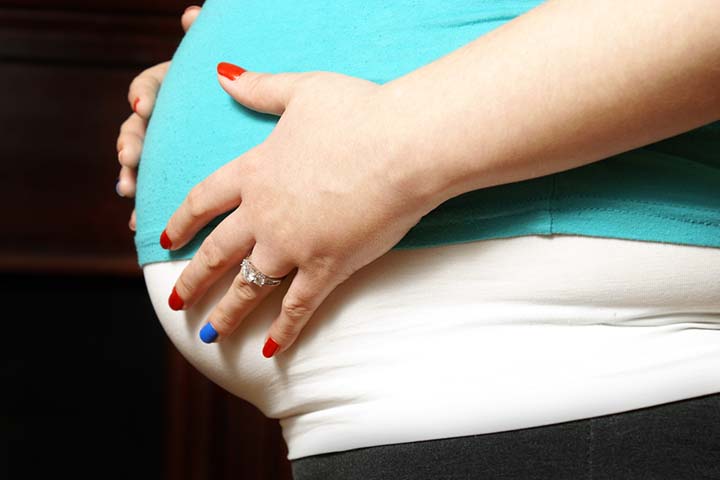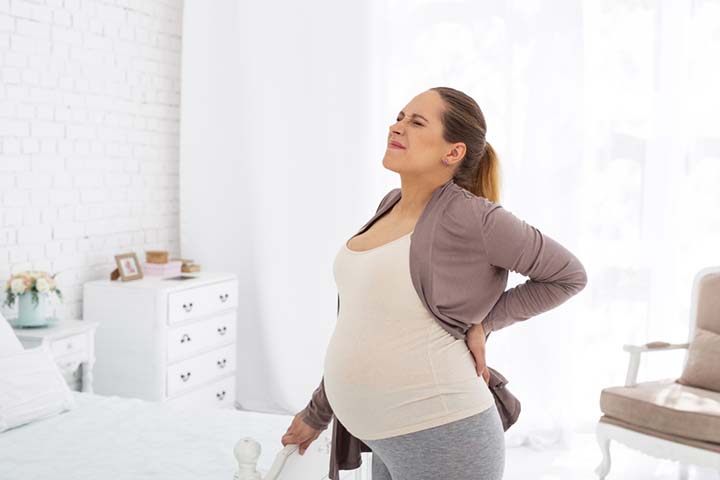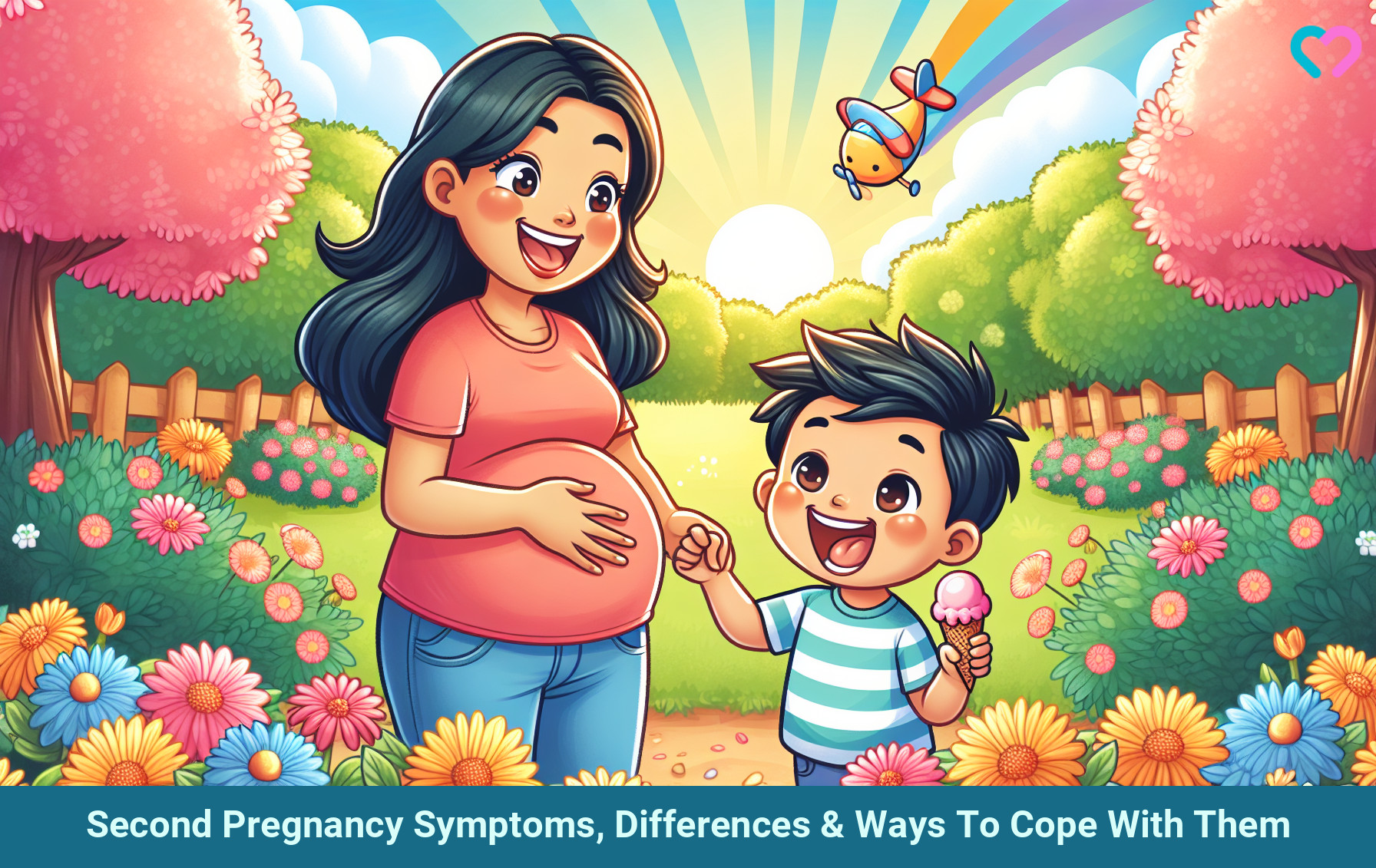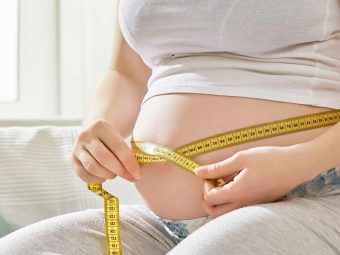
Image: MomJunction
Irrespective of whether it is your first pregnancy or second pregnancy, pregnancy symptoms are generally common across each pregnancy. But sometimes, there may be some second pregnancy symptoms that could appear before the missed period and cause you to feel nervous and anxious. Therefore, understanding the reason behind their occurrence is important.
Read this post as we help you understand everything about your 2nd pregnancy symptoms, including ways to cope with them.
How Are Second Pregnancy Symptoms Different From First?
According to the books ‘Your Second Pregnancy,’ by Katie Tamony and ‘Obstetrics by Ten Teachers, 19th Edition’ by Philip N. Baker and Louise Kenny, here are some of the ways a second pregnancy can probably differ from the first. However, it may or may not be true in individual cases.
- Bump gets bigger sooner: The stomach muscles are weaker than the first time. As they have already been stretched once before, the abdominal muscles are less resistant to stretching the second time, and the belly is likely to show as soon as the baby starts to grow.
Image: Shutterstock
- Breast changes: Change in breasts is common during pregnancy, but the intensity of breast tenderness and pain may increase during the second pregnancy. They may become more sensitive when you are breastfeeding, and the nipples may also hurt more. The pigmented area around the nipple, called the areola, gets darker.
 Research finds
Research finds- Early fetal movements: In the second pregnancy, the signs of fetal development such as baby kicks and movements may be felt sooner because you might identify the sensations sooner.
- Braxton-Hicks contractions are different: You may feel contractions earlier in a second pregnancy than you did in the first pregnancy. These false contractions are a body’s way of preparing for labor. You might also experience post-birth contractions.
- Labor is shorter: Since your body has already gone through the process of childbirth once, it could take less time for cervical dilation and effacement (thinning) the second time. First-time labor lasts for an average of eight hours, whereas the delivery after second pregnancy has an average of five hours.
- Fatigue: You might feel more tired in second or subsequent pregnancies than in your first one. It could be because you are already a mom trying to meet the demands of your older child while dealing with pregnancy fatigue. You may have less time to rest and less pampering from your partner that may all add up to your fatigue.
- Carrying low: Your uterine muscles may lose their firmness, and might not be the same as they were in the first pregnancy. They may not support the baby as they did before, and the baby might drop lower in the abdomen.
- Afterbirth pains: You might have intense afterbirth cramps and contractions, which are the body’s way of shrinking back the uterus to its pre-pregnancy state. Since the uterus is bigger with the second pregnancy, it could be more painful as it gets contracted.
- Back pain: Back pain may increase with the subsequent pregnancy. It might develop due to the shifting of the center of gravity to accommodate the growing uterus. The pain could be intense since the bump shows up earlier in the second pregnancy.
Image: Shutterstock
- Breastfeeding becomes easier: You have already done it before, and you may have a better idea of what to do next. Milk might come in easier in the second pregnancy.
Do You Experience Any Symptoms That You Did The First Time?
Image: Shutterstock
Some usual second pregnancy symptoms that you may experience and have noticed in your first pregnancy too, include:
- Morning sickness
- Frequent urination
- Food cravings due to increased appetite and aversions
- Bloating and constipation
- Mood swings
- Nasal congestion
- Heartburn
- Constipation
- Insomnia
Some other experiences may also recur the second time.
Ekka Zahra Puspita Dewi, a second-time expectant mother from Blitair, writes on her blog, “The symptoms I have today are similar to my first pregnancy. I got morning sickness. My nose is getting sharper in smell. I cannot smell something fishy, fragrance, or other sharp smell. Often, I am getting vomit and nausea (i).”
Do Your Pregnancy Complications Reappear This Time?
The complications you had in the previous pregnancy are likely to occur in the successive pregnancy as well.
Complications such as high blood pressure, premature labor, gestational diabetes, preeclampsia, or postpartum depression might also occur in the subsequent pregnancy, especially in the case of more than one fetus (1). Additionally, varicose veins and hemorrhoids may also reappear in subsequent pregnancies. If you are apprehensive of any possible complications the second time, talk to your doctor about it, and see if they can be avoided.
 Quick tip
Quick tipCan You Test Earlier With The Second Pregnancy?
Image: Shutterstock
You may not even require a pregnancy test to confirm your second pregnancy, as you are likely to show the symptoms sooner than you did before, and you’ll know it. However, it is best to wait until a week after you have missed your period to get an accurate and a meaningful pregnancy test result.
Is The Second Baby Easier To Deliver?
Second babies are usually easier and faster to deliver. Since the muscles, bones, and tissues have undergone stretching previously, it becomes easier for the baby to move through the birth canal in the successive delivery and also the womb contracts more strongly during labor. It usually takes less than an hour of pushing (2).
Second Pregnancy After Cesarean
An immediate pregnancy after a cesarean delivery might leave you exhausted. So it is advisable to wait for at least six months for second pregnancy after your first cesarean section. Waiting for 18 months between delivery and conception may give enough time for the body to heal completely, especially the cesarean section scar on the womb and replenish the lost nutrients (3).
A smaller gap might lead to an increased risk of complications such as premature birth, low birth weight of the baby, or a ruptured uterus.
 Caution
CautionCoping With Your Older Child During The Second Pregnancy
The idea of managing pregnancy while taking care of an older child can be overwhelming. While there are several things to consider before having a second child, talking to your older child and helping them understand what to expect and how to prepare for it could make matters simple (4).
- Tell the child about a new one growing inside your womb, and encourage them to pat your bump, talk or sing to the baby.
- Take them to prenatal check-ups, and let them also listen to the fetal heartbeat sometimes.
- Mention about the baby frequently, but be careful not to go overboard lest they get jealous.
- Involve them in shopping for the baby. Let them choose simpler things like clothes and toys for the little one.
- While you do sensitize the older kid about the baby, make sure you spend some time with them. Go to a library or a park with them, or read some stories during bedtime.
- Give them responsibility and tell them about the things to do when the newborn arrives. Explain how to comfort the baby while crying, helping with diaper changes, giving attention and more.
- Tell the child that he or she will be a big brother/sister, and explain their role and importance in the family.
The idea is to make the older sibling feel loved and involved in important matters such as the arrival of the new baby.
Should You Stop Breastfeeding During Pregnancy?
There is no reason to stop breastfeeding while you are pregnant. Your body is capable of producing enough breast milk for the nursing infant as well as nourishing the baby growing within. However, the breasts and nipples may become tender for some time. According to a systematic review of certain studies, breastfeeding is not likely to affect pregnancies and birth weight (5).
Also, the breasts start producing colostrum (thick milk that is produced towards the end of pregnancy), and your toddler may not like the taste of the milk. At this time, you might notice a drop in the milk intake by your older baby.
How Might Your Postpartum Recovery Differ During Second-time Pregnancy?
You will already know what to expect, and the ways to cope with the changes. Things that happened with your first delivery may not occur with the second birth. The labor also progresses faster, but it might take longer to get your normal body back after childbirth. In general, things might go smoother the second time since you will be aware of how to deal with them.
How To Prepare For Your Next Baby?
Image: Shutterstock
Here are some practical tips you may try for the transition from being a mother of one to a mother of two.
- Arrange a family member or a babysitter to take care of your older child
- Keep everything ready in the storage (such as old clothes, car seat, jumpers, bibs, burp rags) for the new arrival
- Get the diaper bag ready before delivery
- Pack a bag for your older child so that it is easy to carry when you go to the hospital
- Check for the insurance policies
- Stock up the household and personal essentials
- Sterilize pacifiers and feeding bottles
Next, we answer a few common queries about second pregnancy symptoms.
Frequently Asked Questions
1. Is leaking milk an early sign of second pregnancy?
Breast milk could leak early during the second pregnancy. The possibilities are likely to be high if you are still nursing the older baby.
2. How much weight should you gain with your second pregnancy?
According to the US Institute of Medicine (IOM), women of average weight before pregnancy should be gaining around 11.5 to 16kg during pregnancy (6). The ideal weight gain remains the same irrespective of which pregnancy it is. The weight gain during the second pregnancy could be more than that of the first pregnancy. But if you are already overweight, let the weight gain be modest to minimize the risk of developing other pregnancy-related complications like pre-eclampsia and gestational diabetes.
3. Is it easier to predict your labor the second time?
There is no scientific validation to it. However, as you have already gone through labor before, you might be able to recognize the signals earlier than before.
4. What can I do to prepare my body for a second pregnancy?
Preparing yourself for a second pregnancy is similar to preparing for the first. Thus, it includes maintaining a healthy weight and lifestyle before conception. Additional steps for second pregnancy include testing for conditions you had in your first pregnancy, checking the latest vaccinations, and checking for tests and preventive measures for congenital disabilities (8).
5. If the first delivery is normal, can the second one also be normal?
Each pregnancy is different. The mode of delivery for each pregnancy may depend upon various factors such as maternal health, fetal health, fetal position, pregnancy complications, and other medical factors. While the chances of a woman who had a previous normal delivery to have another normal delivery may be high, it is not guaranteed. Therefore, the mode of delivery for each pregnancy may be determined by a healthcare practitioner after assessing the current medical circumstances.
Every pregnancy is special, so is the second one. However, second pregnancy symptoms may include bigger bumps, painful breasts, increased fatigue, shorter labor, etc. Also, certain first pregnancy symptoms and complications such as preeclampsia and gestational diabetes could reappear in a second pregnancy. Getting familiar with these experiences could help you cope better this time. Altogether, a second pregnancy is not completely different from the first and if you have any apprehensions, speak to your doctor to prevent any unfavorable pregnancy outcomes.
Infographic: Care Tips For Second Pregnancy
For most women, the pregnancy journey seems easier the second time; however, there are some essential factors to consider while pregnant with baby number two. Check out this infographic to learn critical aspects to help you have a safe and smooth pregnancy. Illustration: Momjunction Design Team
Key Pointers
- Weaker abdominal muscles may cause physical signs to appear earlier in a second pregnancy, such as a bigger belly bulge and earlier baby movements.
- Breast changes, including soreness, sensitivity, and darker areolas, may be more noticeable in a second pregnancy.
- Intense back discomfort, low-back pain, and fatigue may be more prevalent during subsequent pregnancies.
- Breastfeeding may become easier in a second pregnancy.
- Complications from the first pregnancy, such as gestational diabetes and high blood pressure, may also occur in a second pregnancy.
Image: Dall·E/MomJunction Design Team
Embark on your first pregnancy journey with insights from an OBGYN comparing the unique facets of first and second pregnancies. Learn what to expect and brace yourselves for the journey!
Personal Experience: Source
MomJunction articles include first-hand experiences to provide you with better insights through real-life narratives. Here are the sources of personal accounts referenced in this article.
i. Second Pregnancy;https://medium.com/@ekkazahra2/second-pregnancy-6deb23865603
References
1. Robyn Horsager-Boehrer; Pregnancy complications: What are the chances that they’ll happen again? The University of Texas Southwestern Medical Center (2019)
2. Labour and Delivery Care Module: 5. Conducting a Normal Delivery; The Open University (2020)
3. Lisa Keder; How much time should women take between pregnancies? The Ohio State University Wexner Medical Center (2019)
4. Kyla Boyse; Preparing Children for a New Baby; University of Michigan Health System
5. López-Fernández G et al.; Breastfeeding during pregnancy: A systematic review; Women Birth (2017)
6. Pregnancy and birth: Weight gain in pregnancy; Institute for Quality and Efficiency in Health Care (IQWiG) (2018)
7. J Ingram et al.; Breastfeeding: it is worth trying with the second baby; National Library of Science (2001)
8. J Ingram et al.; Preparing for your next pregnancy; Stanford Medicine















